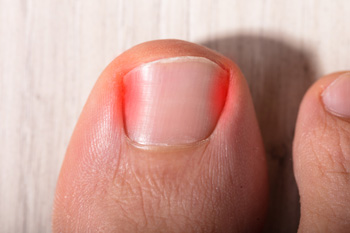
Lansdowne, PA
(610) 626-3338

Lansdowne, PA
(610) 626-3338

Ingrown toenails develop when the corner or edge of a toenail grows into the skin beside it, most often affecting the big toe. Several factors can contribute to the formation of ingrown toenails. Trimming toenails too short or curving them at the edges can direct the nail into the skin. Naturally curved or thickened nails may also increase the risk. Shoes that are too tight or narrow can compress the toes and force the nail edges downward. Repeated toe injuries, such as stubbing or dropping a heavy object on it, also may trigger the problem. Additionally, sweaty feet and prolonged athletic activities, especially sports that involve kicking or pressure on the toes, can make ingrown toenails more likely. When left untreated, pain, swelling, and infection can occur. A podiatrist can evaluate the severity of the ingrown toenail and provide treatment, which may include nail correction or surgery, if necessary. If you are experiencing pain around your toenails, it is suggested that you schedule an appointment with a podiatrist for an evaluation and appropriate treatment.
Ingrown toenails may initially present themselves as a minor discomfort, but they may progress into an infection in the skin without proper treatment. For more information about ingrown toenails, contact Dr. George Yarnell of Pennsylvania. Our doctor can provide the care you need to keep you pain-free and on your feet.
Ingrown Toenails
Ingrown toenails are caused when the corner or side of a toenail grows into the soft flesh surrounding it. They often result in redness, swelling, pain, and in some cases, infection. This condition typically affects the big toe and may recur if it is not treated properly.
Causes
You are more likely to develop an ingrown toenail if you are obese, have diabetes, arthritis, or have any fungal infection in your nails. Additionally, people who have foot or toe deformities are at a higher risk of developing an ingrown toenail.
Symptoms
Some symptoms of ingrown toenails are redness, swelling, and pain. In rare cases, there may be a yellowish drainage coming from the nail.
Treatment
Ignoring an ingrown toenail can have serious complications. Infections of the nail border can progress to a deeper soft-tissue infection, which can then turn into a bone infection. You should always speak with your podiatrist if you suspect you have an ingrown toenail, especially if you have diabetes or poor circulation.
If you have any questions, please feel free to contact our office located in Lansdowne, PA . We offer the newest diagnostic and treatment technologies for all your foot care needs.